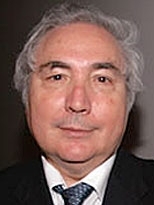There are many ways to define power, but Manuel Castells, Distinguished Visiting Professor of Technology and Society, defines power as the ability to make people think the way you want them to think--or to convince those who disagree that they can't do anything about it.
"The battle (for power) is in the people's minds," said Castells, communication professor at the Annenberg School for Communication at the University of Southern California, during a March 12 lecture on "Communication Technology, Media and Power," part of the spring colloquium held by MIT's Program in Science, Technology and Society.
Now, however, new information technology has shifted the battlefield, Castells said.
Political battles have been traditionally waged in the "public space" of mass media--television, newspapers and radio. The emergence of the Internet and mobile informational technology "has reshaped the public space."
Perhaps the most dramatic example of this shift is the mobile-phone video capturing Sen. George Allen's "macaca" remark. The video was widely distributed over the Internet and Allen was defeated, giving Democrats a Senate majority.
But the Internet is not just new technology, it's a new culture. Italian Prime Minister Silvio Berlusconi misread that culture; he sent a political text message just before an election to 30 million phones, thinking the phone was "just like a TV," Castells said. Italians, who saw the phone as a personal device, thought otherwise, and Berlusconi went down in defeat.
"Throughout history, communication and information are fundamental sources of power and counterpower in our societies--of both domination and social change," Castells said. Everything "depends on how people think and what they believe in."
That does not mean power is in the hands of the media. Mass media is constrained by market forces ("they must win an audience") and journalists' own ethics. But mass media "constitutes the space where power is decided," Castells said. And "what is not in the mass media does not exist."
Thus "a political message is necessarily a media message," Castells said. Furthermore, the "most powerful message is a simple message attached to an image." And that image is often a face. "People vote for faces."
Indeed, character assassination has become a primary political tool all over the world; with no scarcity of damaging material to dig up on opponents, media politics has become scandal politics, Castells said. The result is a general mistrust of all politicians. Democracy "is at an historical low point," he noted. Latin Americans, for example, don't want dictatorships, but they don't like what they see of Western democracy.
The emergence of what Castells calls "mass self communication" is changing political dynamics. Instead of information passing from "one to many," it may go from "many to many"--whether via blogs, chat forums, wikis or places like MySpace.
Consider some statistics: There are 60 million blogs worldwide; one is created every second and 55 percent of new bloggers are still posting after a month. Two-thirds of blog posts are in non-English languages. Only 9 percent of blogs are strictly political; still, that's a lot of blogging, he said.
Also, studies indicate an interest in the Internet increases political interest and activity, he said.
Most importantly, the Internet in-creases the belief that you have power. And the belief that you have power, in Castells' formulation, constitutes real power.
A version of this article appeared in MIT Tech Talk on March 14, 2007 (download PDF).






